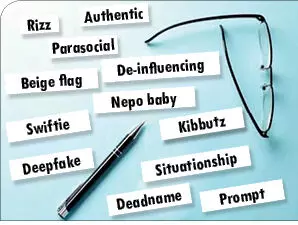Lexical zeitgeist
The practice of announcing ‘word of the year’ provides a window into how the understanding of language affects human brain and behaviours, and reflects the shifting norms of society

What is the word of the year?
There has been an old tradition of choosing one word a year, referring to the most important word(s) or expression(s) in the public sphere during that specific year.
Different institutions, like the Oxford English Dictionary, Merriam-Webster, or Collins Dictionary, often select their own word of the year based on factors such as usage frequency, relevance, or cultural impact.
In neurolinguistics, this annual linguistic symbol can be an intriguing window into understanding how language affects our brains and behaviours. The WOTY could provide insights into how language evolves and spreads in our minds. Neurolinguists study how our brains learn and keep words, exploring how we acquire words, understand their meanings, and remember them.
Oxford’s Word of the Year 2023 is: Rizz
What is Rizz?
A slang term for “romantic appeal or charm.” It’s the middle part of the word “charisma,” which refers to someone’s ability to attract another person through style, charm, or attractiveness. Simply put, it signifies an individual’s captivating presence.
Other words that have been formed in a manner of excluding the first and latter half are ‘fridge’ (refrigerator) and ‘flu’ (influenza).
Usage: The connotation is often sexual or flirty. The word ‘rizz’ can also be used as a verb, often in the phrase ‘rizz up’, which means ‘to attract, seduce, or chat up (a person).’
How do you increase your rizz?
Here are some basic ways to increase your charisma towards someone you wish to attract:
* Exude confidence
* Build strong communication
* Positive body language
* Embrace authenticity
* Show empathy
* Learn from charismatic role models
* Maintain a positive attitude
Merriam-Webster’s word of the year for 2023 is: Authentic
Usage: Authentic cuisine. Authentic voice. Authentic self. Authentic person.
We live in periods of inauthenticity. With social media’s high potential to fake anything, AI is now helping us in every way. Music can be tweaked or created out of thin air, art can be generated within
seconds, and novels and books can be
written entirely off of online software,
and no one knows which one is authentic and which isn’t. With deepfakes taking over people’s privacy and students copying off ChatGPT, one doesn’t know what to trust.
How do you find your authentic, true self?
* Self-reflection
* Identify your core values
* Embrace imperfections
* Trust your intuition
* Pursue genuine interests
* Evaluate your environment
* Engage in personal growth
* Practice self-honesty
* Therapy
The Collins Dictionary word of the year is AI, referring to artificial intelligence.
Other words that were some of the most searched this year:
* Prompt: An instruction given to an artificial intelligence programme, algorithm, etc. that determines or influences the content it generates.
* Situationship: is a blend of ‘situation’ and ‘relationship’. A romantic or sexual relationship that is not considered to be formal or established.
* Kibbutz: A communal farm or settlement in Israel.
* Deadname: The name that a transgender person was given at birth and no longer uses upon transitioning.
* Deepfake: It refers to the convincing alteration and manipulation of an image or recording to misrepresent someone as doing or saying something they did not actually do or say.
* Swiftie: An enthusiastic fan of the singer Taylor Swift.
* Beige flag: It indicates that a partner or potential partner is boring or lacks originality. In the past, it was also referred to as being too “vanilla.”.
* Nepo baby: a term referring to the children of celebrities who have succeeded in careers similar to those of their parents.
* De-influencing: the practice of discouraging people from buying particular products or of encouraging people to reduce their consumption of material goods, especially via social media.
* Parasocial: A parasocial relationship is a one-sided connection with someone in the public eye. An audience experiences this psychological relationship through their mediated encounters with performers in the mass media, particularly on television and online platforms. With more influencers & celebrities growing, there are more parasocial relationships mushrooming.
Which word will you adopt in your lexicon this year?
Send your questions to [email protected]



